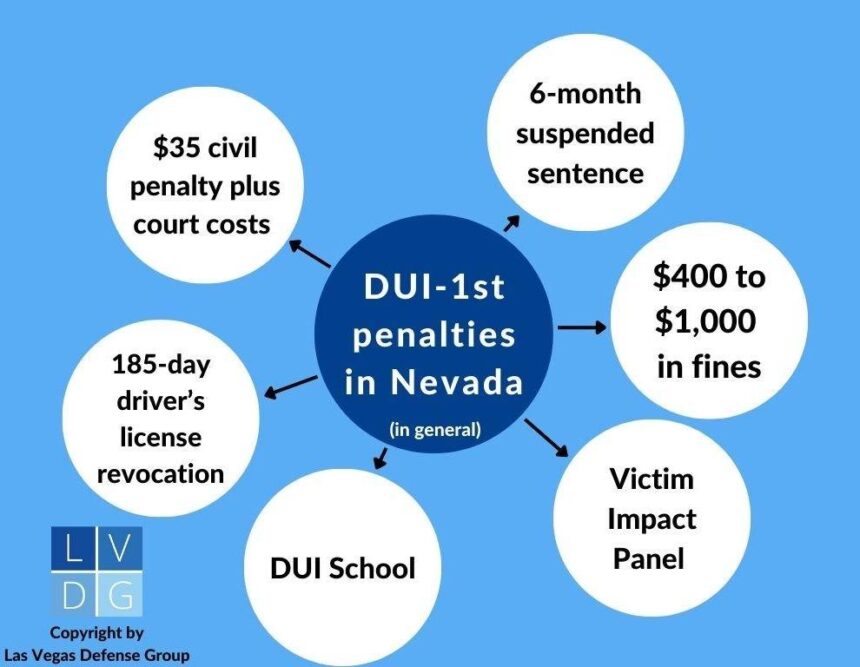Nevada’s Bold Move to Strengthen DUI Penalties: A New Era in Road Safety Enforcement
Legislative Push to Significantly Extend Prison Terms for Repeat DUI Offenders
Nevada is on the verge of implementing some of the most stringent penalties for driving under the influence (DUI) in the United States. State legislators have introduced a bill proposing to raise the maximum incarceration period for repeat DUI offenders from the current 10 years to an unprecedented 25 years. This legislative effort reflects mounting concerns over the increasing frequency of impaired driving incidents and their severe consequences on community safety.
The bill outlines several critical changes designed to deter habitual offenders and enhance public protection, including:
- Significantly longer prison sentences for individuals convicted of three or more DUI offenses.
- Mandatory minimum incarceration periods for cases involving serious injury or fatalities.
- Steeper fines alongside prolonged license suspensions and stricter probation conditions.
| Offense | Current Maximum Sentence | Proposed Maximum Sentence |
|---|---|---|
| First DUI | 6 months | 6 months |
| Second DUI | 1 year | 3 years |
| Third DUI | 10 years | 25 years |
Addressing Public Safety: The Driving Force Behind Tougher DUI Laws
The surge in DUI-related accidents and fatalities has galvanized Nevada lawmakers to adopt a more rigorous stance on impaired driving. The proposed legislation aims to protect communities by imposing harsher penalties on repeat offenders and those whose actions result in serious harm. This legislative shift responds to widespread public demand for stronger measures to combat the dangers posed by intoxicated drivers.
Key provisions of the bill include:
- Mandatory minimum sentences for third and subsequent DUI convictions.
- Longer license suspensions combined with vehicle impoundment to prevent further offenses.
- Increased financial penalties to support rehabilitation initiatives and statewide awareness campaigns.
| Offense Level | Current Maximum Sentence | Proposed Maximum Sentence |
|---|---|---|
| First Offense | 6 months | 1 year |
| Second Offense | 5 years | 10 years |
| Third or More Offenses | 10 years | 25 years |
Expert Opinions: Evaluating the Impact of Lengthy Prison Sentences for DUI
The proposal to extend maximum prison terms for DUI offenders to 25 years has sparked a debate among legal experts. Proponents argue that such stringent penalties could serve as a powerful deterrent, potentially lowering the incidence of repeat offenses and fatal crashes on Nevada’s roads. They emphasize the public safety advantages and the message it sends about the gravity of DUI violations.
On the other hand, some legal analysts warn that excessively long sentences may result in disproportionate punishments, notably for first-time offenders or cases with mitigating factors. Concerns also include the strain on Nevada’s correctional facilities and the broader societal costs associated with extended incarceration.
| Viewpoint | Considerations | Possible Consequences |
|---|---|---|
| Supporters | Stronger deterrence, improved road safety | Decrease in DUI-related deaths and injuries |
| Critics | Fairness in sentencing, prison overcrowding | Potential for unjust penalties, increased correctional costs |
Calls for a Holistic Strategy: Balancing Punishment with Prevention and Rehabilitation
While the push for tougher DUI laws gains momentum, many advocates stress the importance of integrating enforcement with rehabilitation and prevention efforts. They caution that overly harsh penalties alone may not effectively reduce recidivism and could disproportionately affect vulnerable populations. Instead, a thorough approach that includes education, treatment, and community support is essential.
Key recommendations from reform advocates include:
- Robust screening and intervention programs targeting substance abuse among offenders.
- Enhanced public education campaigns to raise awareness about the dangers of impaired driving.
- Support systems designed to prevent relapse and encourage behavioral change.
- Collaborative efforts involving law enforcement, healthcare providers, and community organizations to foster safer roads.
| Component | Expected Benefit |
|---|---|
| Longer Sentences | Potential deterrence balanced against risk of overcrowding |
| Rehabilitation Programs | Reduced rates of repeat offenses |
| Public Awareness | Greater community understanding and prevention |
| Alternative Sentencing | Improved reintegration and reduced incarceration |
Conclusion: Nevada’s DUI Law Reform as a Potential National Benchmark
As Nevada advances toward adopting one of the nation’s most rigorous DUI sentencing frameworks,the proposed increase to a 25-year maximum prison term represents a pivotal shift in tackling impaired driving. Advocates believe these tougher penalties are crucial for deterring repeat offenders and enhancing public safety, while opponents urge caution to avoid excessive incarceration and its associated challenges. The final outcome of this legislative effort will have significant implications for Nevada’s criminal justice landscape and may serve as a model for other states confronting similar DUI challenges.
